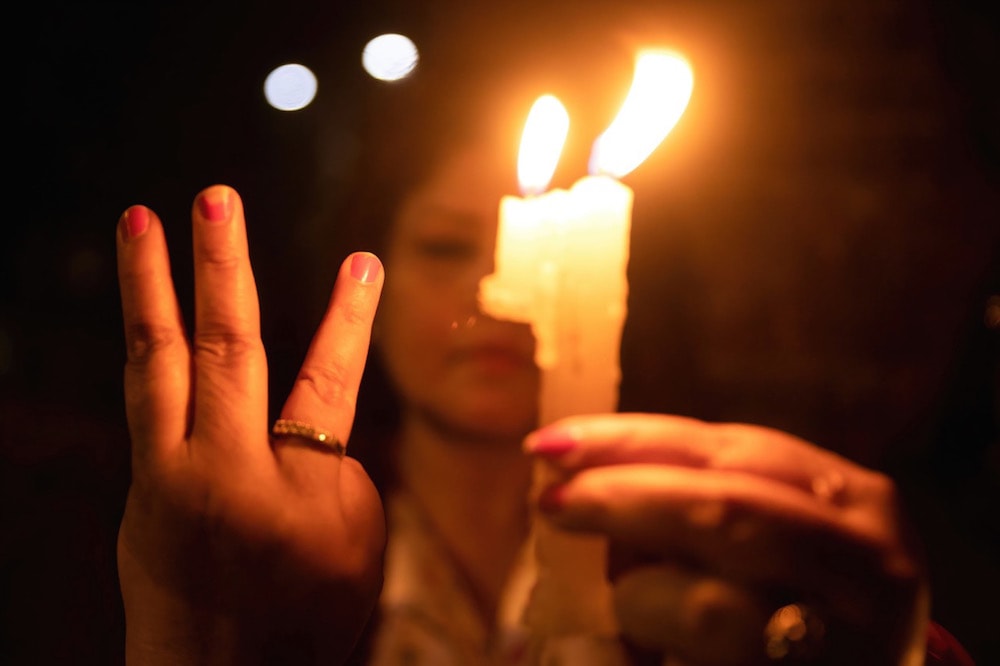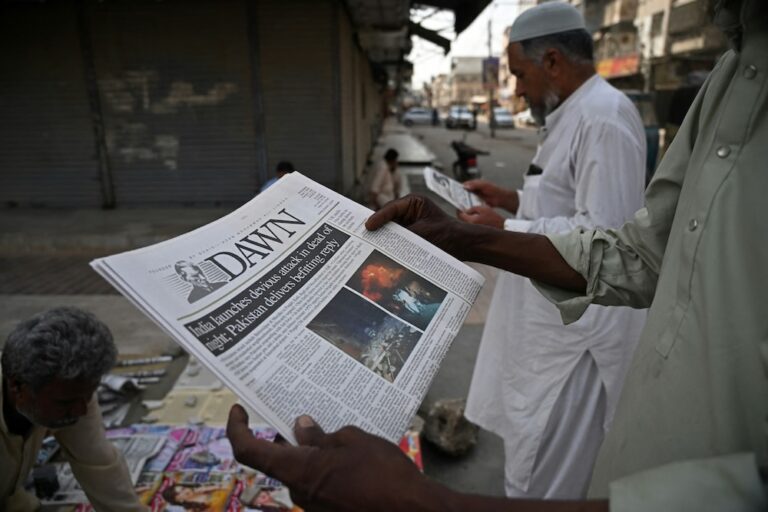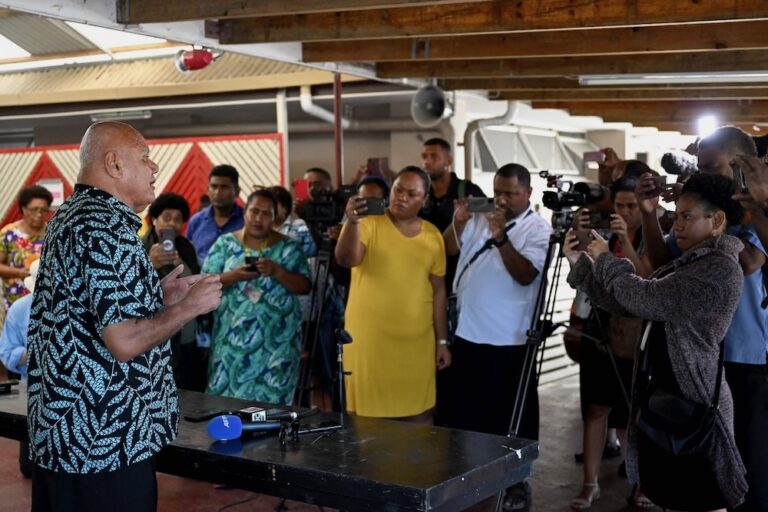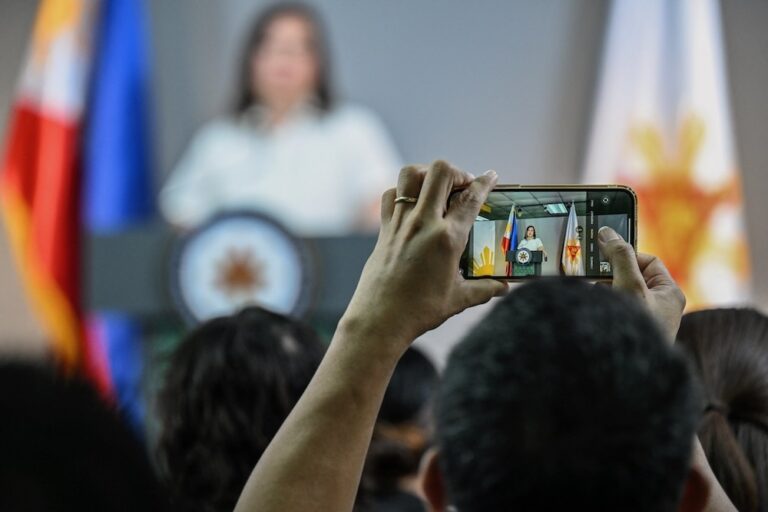March 2021 in Asia-Pacific: A free expression roundup produced by IFEX's regional editor Mong Palatino, based on IFEX member reports and news from the region.
Violence escalates in Myanmar, but the people are fighting back. Women journalists are attacked and killed in Afghanistan. Public outrage in Bangladesh over the killing of a writer and torture of a cartoonist in prison. New laws and regulations undermine media freedom and digital rights in Malaysia and India.
Coup terror, resistance, and solidarity in Myanmar
Myanmar’s military unleashed a brutal nonstop crackdown targeting anti-coup protesters in the past month. But the democracy movement remained defiant, despite the terror tactics of security forces. As of 30 March, the number of protesters killed for opposing the coup has reached 520. Authorities have arrested at least 2,729 individuals.
The right to information is also a casualty, as the military has targeted the media covering the protests. The licenses of five independent media outlets, including IFEX member Mizzima, have been revoked. Some offices have been raided, and threats of further attacks forced newspapers to stop operating. Only state-backed printed newspapers have remained in business.
As of 25 March, at least 45 journalists have been arrested since the start of the coup on 1 February. BBC correspondent Aung Thura was released on 22 March after three days of interrogation, but Mizzima News journalist Than Htike Aung remains in detention. Both were arrested while reporting in the capital Nay Pyi Taw. Meanwhile, Associated Press journalist Thein Zaw was freed from prison on 24 March, three weeks after his arrest.
On 29 March, the military arrested five more journalists in Kachin and Shan states.
IFEX has issued a statement expressing solidarity to Mizzima and other advocates of freedom of expression.
“The IFEX network will continue to stand in solidarity with our colleagues at Mizzima, and with all those defending the right to freedom of expression and democratic rights in Myanmar. Journalism is not a crime, and Mizzima and other media outlets play an essential role in shedding light on the horrific violence being perpetrated by Myanmar’s military junta against their own people – violence we condemn unequivocally,” said IFEX Executive Director Annie Game.
PEN Myanmar has called for the release of poets who were arrested for protesting against the coup. They have also asked fellow artists to support Myanmar’s fight for the restoration of civilian rule. Cartoonists from around the world are among those who have consistently offered solidarity to Myanmar, sharing artworks using the hashtag #ThreeFingers, which refers to the protest symbol used by anti-coup protesters.
Afghanistan: Media killings and attacks against women journalists
Mursal Waheedi, Saadia Sadat, and Shahnaz Raoufi were three young female workers of the Enikas TV network who were shot and killed while on their way home in Jalalabad City on 2 March.
These killings are part of a deeply troubling trend in Afghanistan, where 11 journalists and media workers have been killed in the past year.
The continuing impunity in these cases “undermines the public right to know, and creates an environment of self-censorship, hiding, and fleeing for dozens of journalists from Afghanistan,” said Ahmad Quraishi, the executive director of IFEX member the Afghanistan Journalists Center.
Attacks against women journalists have also sharply increased. The Centre for the Protection of Afghan Women Journalists (CPAWJ) has registered more than 100 cases of aggression against women journalists in the past 12 months. CPAWJ director Farida Nekzad said:
“Eliminating women journalists is tantamount to imposing silence on all other women. In Afghanistan, men think through men’s eyes. They don’t want to pay attention to the issues that concern us. A news organisation without women is a guarantee that many subjects will never be covered.”
Alarmed by the media situation in Afghanistan, several civil society groups have sent a letter to the UN Security Council and the United Nations Assistance Mission in Afghanistan demanding urgent and concrete action to protect journalists in the country, and stating that “[t]argeting journalists creates a societal ripple effect of fear and censorship and deprives the public of crucial information about the peace process.”
Bangladesh: Who tortured cartoonist Ahmed Kabir Kishore?
Protests erupted in Bangladesh after writer Mushtaq Ahmed died in detention on 25 February. His fellow detainee, cartoonist Ahmed Kabir Kishore, was granted bail and released on 4 March.
They had both been arrested in May 2020, after criticising the government’s pandemic response.
Protests have called for the repeal of the Digital Security Act, which authorities used to detain both artists.
After his release, Kishore was treated in hospital for a burst eardrum, leg injuries, and diabetes. He filed a torture complaint against his jailers and the case is now pending in a Dhaka court.
He shared his prison ordeal in an interview with Aliya Iftikhar of the Committee to Protect Journalists (CPJ).
“They started showing my cartoons on a screen and questioning me, asking “Why did you draw this cartoon? Who is this guy?” about a corrupt man I had drawn. They started beating me.”
IFEX member Cartoonists Rights Network International wrote that “those responsible must be found, given an opportunity to account for themselves, and, if found to have broken the law, receive the due penalties.”
In brief
India’s new digital rules. The Indian government has released “Guidelines for Intermediaries and Digital Media Ethics Code” which critics contend will make it easier for authorities to compel social media platforms to remove content. The rules prescribe a three-tier system of regulation involving publishers, a self-regulatory association of publishers, and an oversight body set up by the Ministry of Information and Broadcasting. IFEX member SFLC.in has published an initial analysis of the new rules and warned that granting broad powers to this oversight body “sets a dangerous precedent where freedom of speech and expression, the freedom of press and the right to dissent will all be at the mercy of the government or its agencies.” A network of digital news media in India has already filed a court petition against the new rules.
Sri Lankan president threatens media. An excerpt of President Gotabhaya Rajapaksa’s statement on 20 March mentions the media: “I know how to teach a lesson if they need to be taught. Those who worked against us during the war are in those media institutions.” The Media Organisations Collective immediately released a joint statement expressing concern about the remarks since it “gave a dangerous signal of an ominous threat to the freedom of media and expression” in the country.
Malaysia passes ‘fake news’ ordinance. Malaysia’s Emergency (Essential Powers) (No. 2) Ordinance 2021, a measure that criminalizes the publication of “fake news” pertaining to COVID-19 and the state of emergency proclamation, took effect on 12 March. The ordinance also allows the police to access computerised data, including passwords and encryption codes. IFEX member The Centre for Independent Journalism (CIJ) has warned that the ordinance could be abused by authorities, noting that:
“Fake news” is not clearly defined in the law, opening the real possibilities of abuse through arbitrary arrests, investigations and punitive actions being taken against the alleged offender.
A win in Fiji. Fiji’s prime minister has announced that a police bill that was already released for public consultation will no longer be submitted to the parliament. The proposed legislation grants broad powers to the police to seize, take control, and prosecute anyone in Fiji, including the media, without a warrant. Police can also seize electronic devices, computers, emails and oblige ISP providers to submit information on internet users. Several groups have opposed the bill and described it as draconian.
New and noteworthy
ARTICLE 19 has submitted a Universal Periodic Review (UPR) report on the situation of freedom of expression in Thailand, as the pro-democracy movement continues to gather support despite violent reprisals from state forces. The submission highlights issues related to restrictions on the right to protest, Lèse Majesté (anti-Royal Insult law) proceedings, and criminal defamation prosecutions. Among the recommendations are the repeal of Section 112 of the Criminal Code pertaining to Lèse Majesté and a demand to the government to refrain from invoking emergency powers to restrict the right to protest. Thailand’s third UPR will take place in November 2021.
In the Philippines, Maria Ressa’s ordeal continues. A new study by the International Center for Journalists, University of Sheffield, and Rappler news website features a “forensic analysis of the torrent of social media attacks” directed against Filipino-American journalist Ressa. The study found direct evidence that the online violence targeting Ressa has offline consequences. The detailed attacks against Ressa, which intensified after President Rodrigo Duterte came to power in 2016, were documented in a timeline recently released by the Coalition For Women In Journalism.



